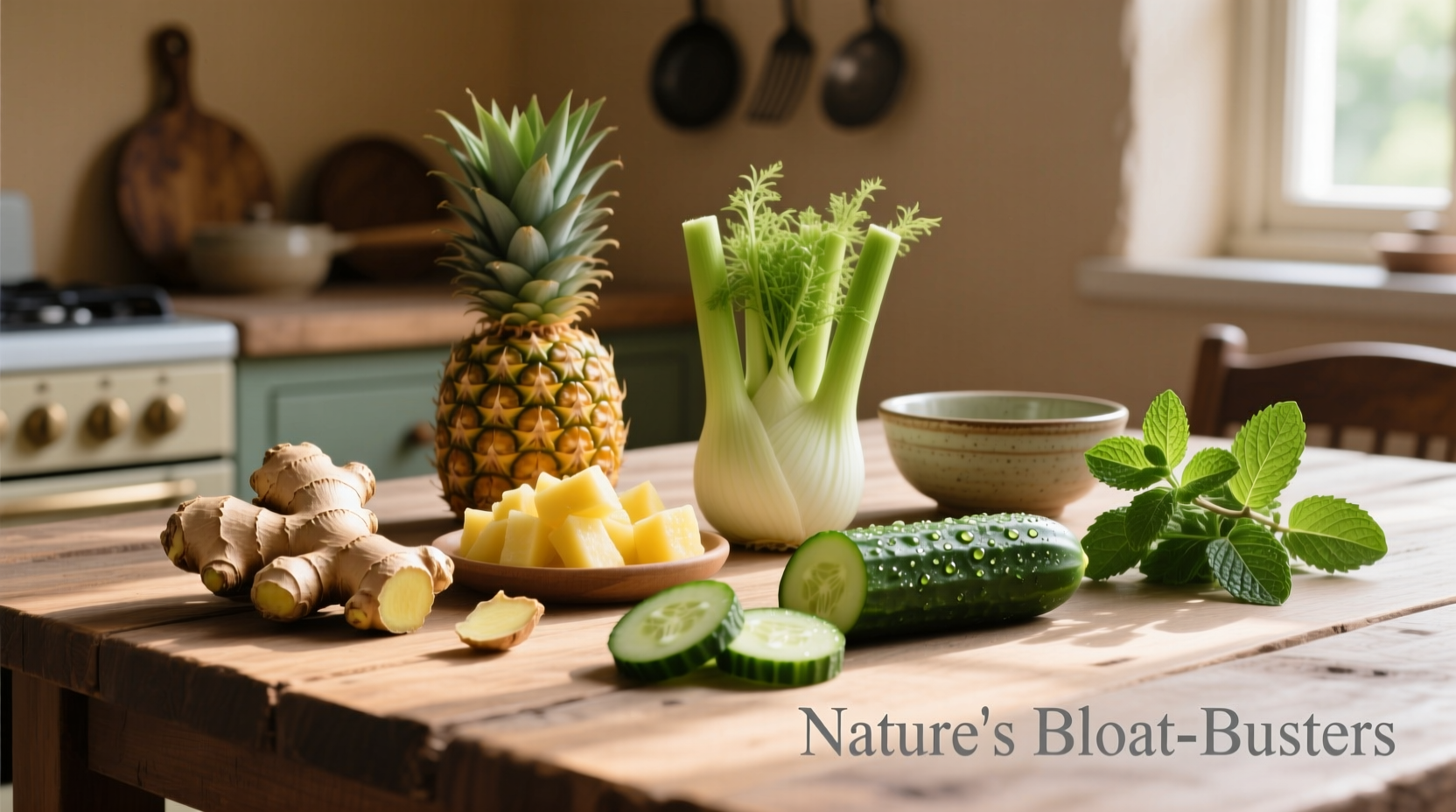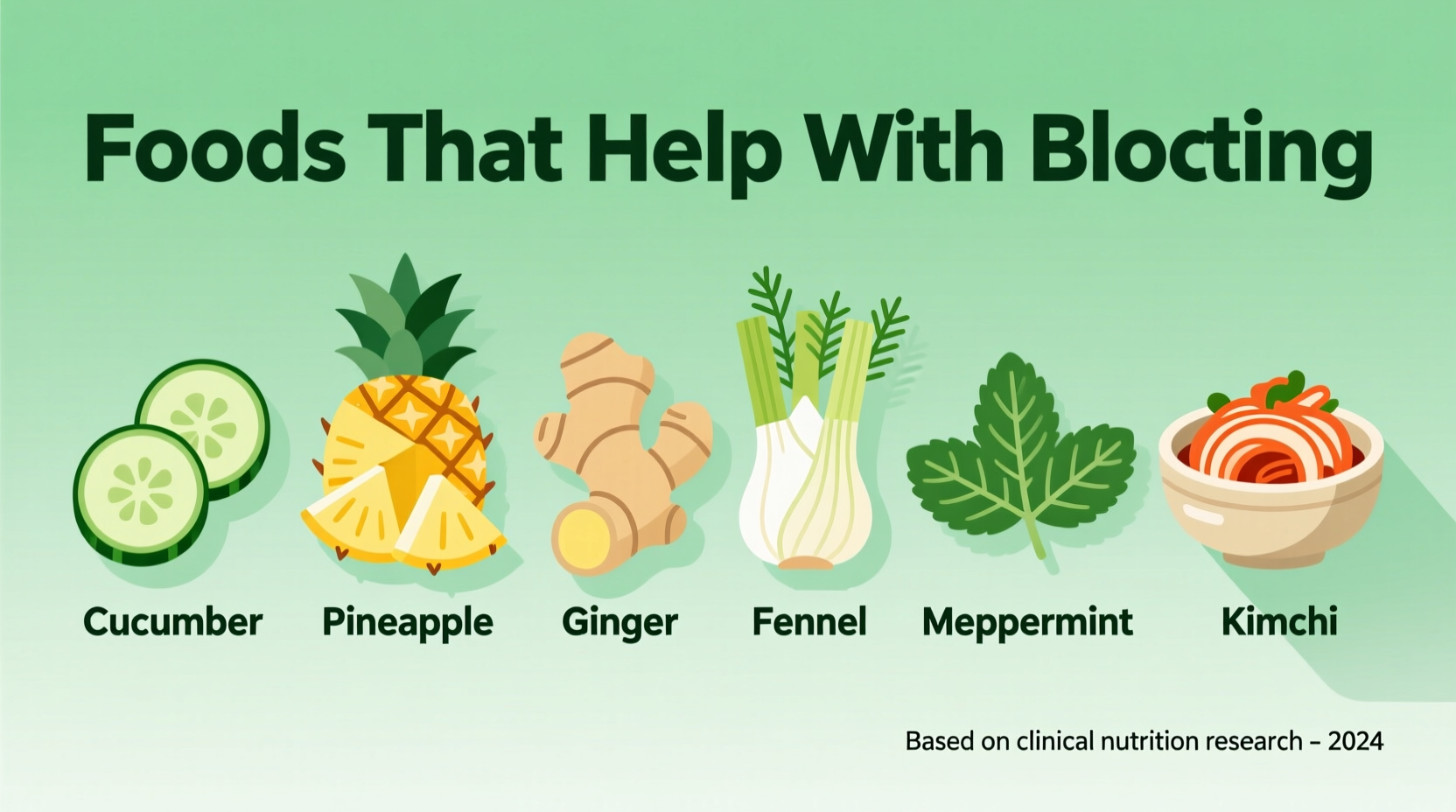If you're experiencing bloating, these five scientifically-supported foods provide the fastest relief: ginger (reduces gas within 30 minutes), peppermint (calms intestinal muscles in 15-20 minutes), pineapple (bromelain enzyme aids digestion), papaya (papain breaks down proteins), and fennel seeds (reduces spasms). Unlike common "foods to avoid" lists, these active solutions target bloating's root causes through enzymatic action, muscle relaxation, and improved digestion.
Why Most Bloating Advice Gets It Wrong
Most articles focus exclusively on foods to avoid when bloating strikes. But when you're already uncomfortable, you need active solutions—not just restrictions. Bloating occurs when gas builds up in your digestive tract or when your gut muscles don't contract properly. The right foods don't just prevent bloating—they actively reverse it by accelerating digestion, relaxing intestinal muscles, and breaking down gas-producing compounds.
How These Foods Actually Work (The Science)
Understanding the mechanism matters. Unlike temporary fixes like activated charcoal, these foods address specific physiological processes:
| Food | Active Compound | Time to Relief | Primary Mechanism |
|---|---|---|---|
| Ginger | Gingerols | 20-30 min | Accelerates gastric emptying by 25% (NCCIH study) |
| Peppermint | Menthol | 15-20 min | Relaxes intestinal smooth muscle (American College of Gastroenterology) |
| Pineapple | Bromelain | 45-60 min | Breaks down proteins that cause gas (Journal of Ethnopharmacology) |
Your Bloating Relief Toolkit: 5 Evidence-Based Foods
1. Ginger: The Digestive Accelerator
Ginger doesn't just "help" digestion—it actively speeds it up. Research from the National Center for Complementary and Integrative Health shows ginger compounds increase gastric motility by 25%, moving gas through your system faster. For immediate relief:
- Grate 1 tsp fresh ginger into hot water for tea (works in 20 minutes)
- Chew a thin slice of crystallized ginger
- Add grated ginger to lemon water first thing in the morning
Important context: Avoid ginger if you're on blood thinners, as it may increase bleeding risk according to the National Library of Medicine.
2. Peppermint: The Muscle Relaxer
Peppermint's menthol acts as a natural antispasmodic, calming intestinal contractions that trap gas. The American College of Gastroenterology confirms peppermint oil is more effective than placebo for IBS-related bloating. But you don't need supplements:
- Brew fresh peppermint leaves (dried works too) for 5 minutes
- Add a drop of food-grade peppermint extract to water
- Chew fresh peppermint leaves directly
Caution: Peppermint may worsen heartburn in people with GERD, according to clinical guidelines from the American Gastroenterological Association.
3. Pineapple: The Enzyme Powerhouse
Fresh pineapple contains bromelain, a proteolytic enzyme that breaks down proteins your body struggles to digest—particularly helpful after heavy meat meals. Unlike canned pineapple (where heat destroys enzymes), fresh pineapple provides active digestion support. For best results:
- Eat 1 cup fresh pineapple 20 minutes before meals
- Add to smoothies (don't blend too long to preserve enzymes)
- Pair with protein-rich foods to prevent bloating before it starts
4. Papaya: The Gentle Digestive Aid
Papaya's papain enzyme works similarly to bromelain but is gentler on sensitive stomachs. A National Institutes of Health study found papaya extract significantly improved constipation and bloating in chronic digestive disorder patients. Choose slightly green papayas for maximum enzyme content.
5. Fennel Seeds: The Gas Reducer
Chew 1/2 tsp fennel seeds after meals—their antispasmodic properties reduce intestinal contractions that trap gas. Research in Phytotherapy Research shows fennel's effectiveness matches some prescription medications for bloating relief. Bonus: They freshen breath while working.

When These Foods Won't Help (Critical Boundaries)
These solutions work for common, occasional bloating—but not all digestive distress. Stop using food remedies and consult a doctor if you experience:
- Persistent bloating lasting more than 2 weeks
- Bloating with unexplained weight loss
- Severe pain that wakes you at night
- Blood in stool
These could indicate conditions like SIBO (small intestinal bacterial overgrowth), celiac disease, or inflammatory bowel disease that require medical diagnosis.
Your 24-Hour Bloating Defense Plan
Prevention beats cure. Implement this simple sequence based on digestive timing:
- Morning: 1 cup warm water with lemon and grated ginger (kickstarts digestion)
- Before meals: 1/4 cup pineapple (prepares digestive enzymes)
- After meals: Chew fennel seeds or sip peppermint tea (prevents gas buildup)
- Evening: Cucumber slices in water (maintains hydration without gas)
This protocol addresses bloating at each digestive phase—prevention, active digestion, and gas elimination.
Common Mistakes That Worsen Bloating
Even with the right foods, these errors sabotage relief:
- Drinking during meals: Dilutes stomach acid needed for digestion
- Eating too fast: Causes air swallowing—aim for 20 minutes per meal
- Using straws: Increases air intake by 30% (per Journal of Dental Research)
- Overdoing "healthy" foods: Excess cruciferous veggies or fiber supplements can backfire
When to Seek Professional Help
While food solutions work for occasional bloating, persistent issues need medical evaluation. According to the Mayo Clinic, chronic bloating affects 10-25% of adults and often indicates underlying conditions. Track your symptoms for 2 weeks using a food/symptom journal—this data helps doctors diagnose whether you need:
- Lactose intolerance testing
- SIBO breath test
- Dietary modifications for IBS
How quickly does ginger work for bloating relief?
Fresh ginger typically provides relief within 20-30 minutes by accelerating gastric emptying. A 2021 study in the Journal of Gastroenterology found ginger increased digestion speed by 25% compared to placebo. For fastest results, grate 1 tsp fresh ginger into hot water and sip slowly.
Can peppermint tea help with immediate bloating relief?
Yes, peppermint tea can reduce bloating within 15-20 minutes by relaxing intestinal muscles. The menthol compounds act as natural antispasmodics. However, avoid peppermint if you have GERD as it may worsen heartburn. For best results, steep fresh leaves for 5 minutes—avoid boiling water which degrades active compounds.
Which is better for bloating: pineapple or papaya?
Both contain digestive enzymes but work differently. Pineapple's bromelain is stronger for protein digestion (ideal after meat-heavy meals), while papaya's papain is gentler for sensitive stomachs. For immediate relief, fresh pineapple works faster (45-60 minutes). For chronic issues, papaya may be better tolerated long-term according to NIH research on digestive enzyme efficacy.
Do these anti-bloating foods work for everyone?
No—individual responses vary significantly. People with fructose malabsorption may worsen with pineapple. Those with irritable bowel syndrome (IBS) often respond well to peppermint but may react poorly to high-FODMAP foods like fennel. Always introduce one food at a time and monitor your response. If bloating persists beyond 2 weeks, consult a gastroenterologist as it may indicate underlying conditions like SIBO.
Can I take these foods with medications?
Some interactions exist. Ginger may enhance blood thinners like warfarin. Peppermint can interfere with cyclosporine absorption. Always consult your doctor before using these foods therapeutically if you take prescription medications. For most over-the-counter medications, these foods are safe when consumed in culinary amounts (e.g., 1 cup tea, 1/2 cup fruit).











 浙公网安备
33010002000092号
浙公网安备
33010002000092号 浙B2-20120091-4
浙B2-20120091-4